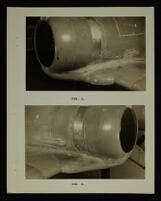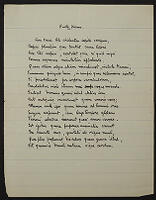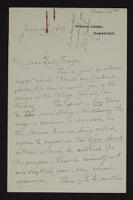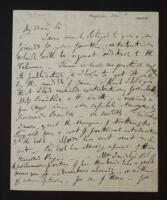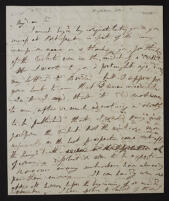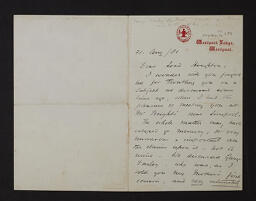Bateman's, Burwash, Sussex - Her letters haven't reached him, hasn't stayed at the Meurice Hotel for years; the booklet is an improvement on the yellow 'volumette'; wishes they could be at home to receive them and François Ceccaldi later in the month.
Newstead Abbey.
(The envelope bears the printed words ‘On His Britannic Majesty’s Service’, and is labelled ‘Bill of Lading | for Lord Byrons Furniture | Ref. F.O. Desp. No 9. (L2523/43/402) | 19/5/32.’ This is presumably the envelope in which the bill was sent from Venice.)
Army and Navy Club, Pall Mall, S.W.—He and his wife propose to present to the College a letter from Byron to Trelawny (R.2.40A/10), to be put with the cap sent four years earlier.
(The cap is still in the College’s possession.)
—————
Transcript
Army & Navy Club, Pall Mall, S.W.
June 28th. 1912 {1}
My dear Innes,
Do you remember four years ago prevailing on the Master to take charge of the Cap worn by Lord Byron?
My wife and I think the College might like to possess and place with it, a characteristic letter from the poet to Trelawny.
I hope all is well with you & yours, our kind regards to Mrs. Innes
I have not forgotten having tea with her on the bowling alley green
Yours sincerely,
C. F. Call
—————
McLeod Innes has written at the top, ‘Ans[were]d 1.vii.12 | confident College delighted’, and another person has added in pencil, ‘Col. Call’s gift’.
Brasted - RJ has received a very positive letter from Lord Lansdowne concerning RJ's book ['An Essay on the Distribution of Wealth and the Sources of Taxation', 1832]: 'he had read it with the attention it so eminently deserves'. Having thus read the book he concluded that they [Ricardians] had fallen 'into error by reasoning too much from narrow grounds and that he values proportionably better views - sound inductions etc.'. Lansdowne wants RJ to call on him when in London. 'I am pleased - it is a good and leading opinion gained and apparently strongly gained and apparently strongly pronounced and you whose reputation is more than half committed to the book will not I am sure be above being pleased too'.
Trinity Lodge, Cambridge - Her husband has asked her to report on the College Council discussions of the Wyse Fund: the Statutes do not allow a double Fellowship being allocated, and no funds allowed for Beneficent purposes may be voted to a Fellow; she does hope 'that a successful plan will quietly be carried out by the user of The Wyse fund'.
Whitton Park, Hounslow. - Agrees as to inadvisability of publishing memoir of Charles Skinner Matthews: personal details of his short life, including 'passion for Whist & for boxing; will overshadow importance of a talent never fully developed; will inform Henry Matthews. Scrope Berdmore Davies had only about £200 on departure last year, but Mr Hibbert thinks he might escape calamity of income from King's College fellowship can be conveyed to him; he is at Ostend with irretrievable debts of seventeen or eighteen thousand pounds; Mr Andrews will be hardest hit'; Davies should have sought help from his friends rather than obtain money under false pretences. Hibbert's address is 47 Great Ormond Street.
Stoke near Chichester. - Milnes' and other contributions to The Tribute; subscribers to posthumous volume of Edward Smedley's poetry; will send copies to Darley and Tennyson; will travel to London next week.
Castle Ashby.- Cannot postpone publication of The Tribute until winter; misunderstanding about number of copies to be sent to Tennyson and Darley; subscribers.
Probably a commercially-produced print. Captioned below by hand, ‘South Side I. | Evangelists & Teachers.’
Of a similar date to the photograph on f. 2r.
Probably a commercially-produced print. Captioned below by hand, ‘South Side II. | The Church of the First Days.’
Of a similar date to the photograph on f. 2r.
Probably a commercially-produced print. Captioned below by hand, ‘South Side IV. | The Anglo-Saxon Church.’
Of a similar date to the photograph on f. 2r.
A commercially-produced print, captioned on the image, ‘Roof of King’s College Chapel, Cambridge. 3404. G.W.W.’
Of a similar date to the print on f. 2r.
A commercially-produced print, captioned on the image, ‘Gate of Humility, Gonville & Caius College, Cambridge. 7666. G.W.W.’
Of a similar date to the print on f. 2r.
A commercially-produced print, captioned on the image, ‘Avenue & Gate in Trinity College, Cambridge. [An illegible number.] G.W.W.’ (The caption is faint, and the reading is not entirely certain.)
Of a similar date to the print on f. 2r.
A commercially-produced print, captioned on the image, ‘St John’s Bridge and College from River, Cambridge. 6071. J.V.’ The photograph includes two men leaning over the bridge and part of the ‘Bridge of Sighs’ in the background.
Of a similar date to the print on f. 2r.
These arches were uncovered in 1893, as explained in the article in The Builder pasted below the photograph.
Of a similar date to the print on f. 2r.
A commercially-produced print stamped, in capitals, ‘Messrs Stearn, Photos: Cambridge.’ The image is rather poor.
The heading is, in capitals, ‘The Stained Glass of the Great West Window, King’s College Chapel, Cambridge, by John R. Clayton and Alfred Bell.’
Perhaps the photograph shows Richard Appleton in his rooms at Trinity, but the subject and the location of the room have not been identified.
A colour print of a painting by D. Warren. Below the illustration are the words ‘In proud and loving memory of’, in capitals, followed by a blank space. Copyright by Landeker & Brown Ltd, London, E.C.2.
According to the notes inserted before this page the people in this photograph are as follows:
Back row: unidentified man; Lady Constance Veronica Bruce; three unidentified men; 'Mademoiselle' (L. Krauth?); Henry Babington Smith.
Middle row: Lady Christian Augusta Bruce; unidentified man; Lady Elisabeth Mary Bruce; the Viceroy; the Maharaja of Gwalior; the Countess of Elgin; Colonel Algernon Durand(?); unidentified man; the Hon. Mrs Grant.
Front row: Viscount Fincastle; two unidentified men.
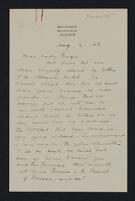
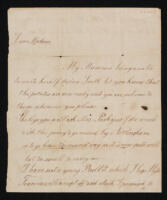
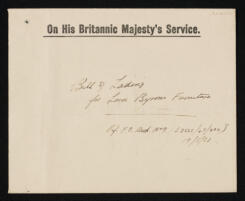
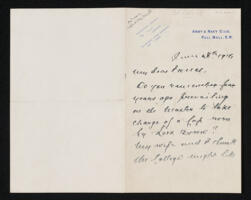
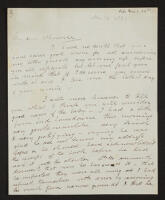
![Letter from Mrs J. G. Lockhart [Charlotte Sophia Lockhart] to Mrs [J.] Marshall](/uploads/r/trinity-college-library/6/4/1/6418df14260097807065ada1ac7634f6208cbd2bd5af34613d763e84b54d850d/Add.ms.c.87_28_thumb.jpg)
